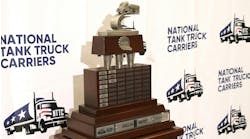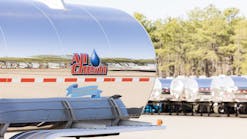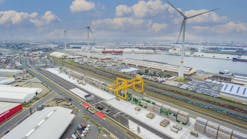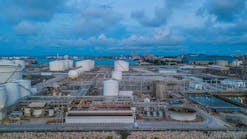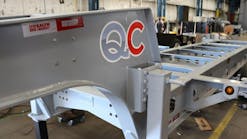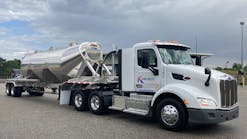As the Saying goes: Slow but steady wins the race. That certainly has been true for Tidewater Transit Co Inc, a $54 million tank truck carrier based in Kinston, North Carolina.
For nearly 60 years, the management team at Tidewater Transit has charted a very deliberate course to success. They focused initially on providing outstanding bulk transport service to a relatively small group of core customers and built a diverse operation in the process. It's a strategy that continues to pay dividends today.
“We show absolute and total dedication to our customers,” says John O McNairy, Tidewater Transit president. “Along with being customer oriented, we're very flexible. We provide the service they want, whether that means hauling liquid chemicals or dry bulk materials. We also offer logistics services, and we run truck-rail transloading facilities. We're constantly expanding services to meet the changing needs of our customers, and we always try to provide the very best equipment for the job.”
The company that evolved into Tidewater Transit commenced operation in 1949. It was established with $5,000 capital by C Felix Harvey and Charles Smith to service an agricultural business belonging to Harvey. Smith was the truck driver, his wife, Nina, took care of the books, and initial cargoes included gasoline, anhydrous ammonia, and fertilizer.
From the very beginning, they built a lean operation with a family atmosphere, and they focused on avoiding debt without sacrificing the ability to meet evolving customer needs. These factors formed the basis for a company culture that continues to drive success for the carrier.
“We've tried to maintain a family environment here, because we believe that brings out the best in our employees,” McNairy says. “We also believe that avoiding debt has been one of our biggest assets. Our drive toward excellence in customer service is reflected in the fact that we have been a partner in the American Chemistry Council's Responsible Care program for a number of years.”
Top forty
Today, the tank truck carrier that Harvey and Smith started ranks among the top 40 in the United States. The carrier runs 350 company-owned tractors, a handful of owner-operator tractors, and 780 trailers. Equipment is dispersed among 14 terminals in eight states.
Tidewater Transit has expanded well beyond its eastern North Carolina base. While most of the terminals are in the South and Mid-south, the carrier serves customers throughout the Continental United States, as well as parts of Canada. Interline service is provided into Mexico.
Cargoes are more varied today. The carrier expanded from the initial three liquid cargoes into a wide range of chemicals, both liquid and dry. Acids are part of the cargo mix. Plastics now account for about half of the 1600 shipments a week that the carrier handles on average.
“We've been transporting plastic pellets since 1988,” says Lance Collette, Tidewater Transit executive vice-president. “We began a major push in 1992 to expand our operating area and increase the range of products hauled. We plan to maintain the cargo diversity, because we believe that has given us an advantage with our customers.”
Customer diversity
The customer base also became more diverse over the years. However, the company remains very focused on dedicated carriage, and fully dedicated service still accounts for about 15% of the business, according to Collette.
“We try to focus on customers who put a priority on service,” he says. “Certainly, we experienced pricing pressures during 2007. However, most of our customers want value in liquid and dry bulk transportation.
“We give them the customized transportation service that they need, and we work with them closely to meet very exacting requirements. We'll haul just about any liquid or dry bulk cargo that a customer wants to ship, and we'll take it just about anywhere in the United States and Canada.
“We take a lot of pride in the quality of the service we provide, and we follow the Responsible Care Management System process. We track our performance on a daily basis, and we consistently achieve 99.75% error-free performance. We monitor each service failure, and we address problems immediately.”
A key strength at Tidewater Transit is its ability to take on specialized projects for customers. “For one chemical shipper, we provide on-site dispatch service, and we've begun managing all of that customer's in-plant distribution activity,” says Tom Theriault, Tidewater Transit vice-president of sales. We run a 50-car rail yard for a chemical shipper and monitor product inventories. We set up a dedicated operation in Georgia to transport and transload calcium carbonate (marble dust). We're moving 18 loads a day in that program. I believe we'll see more of these projects in the future, and we certainly want to do more with aggregates.”
Tidewater Transit owns a rail transloading site in Fayetteville, North Carolina, that it operates for the Norfolk Southern Thoroughbred Bulk Transfer (TBT) system. The carrier also operates a TBT site in Dalton, Georgia.
“We see transloading as a growth opportunity,” Theriault says. “Both of these sites are plastics oriented, but we would be willing to transload a wide range of products in the future.”
Computer control
With such a diverse operation, the Tidewater Transit management team realized they needed state-of-the-art computer capabilities to maximize operational efficiency and effectiveness. The carrier recently upgraded its fleet management software to TMW Suite from TMW Systems.
“Our goal is to gain greater control over our business with the TMW product,” says Dave Arnold, Tidewater Transit vice-president of operations. “We're a strong advocate of using digital technology to enhance our fleet management abilities. For instance, we were an early-adopter of GPS technology. We've been using the PeopleNet system in our tractors for the past six years, and we're getting ready to add PeopleNet's trailer tracking capability.”
The tracking and communication technology has been particularly helpful when it comes to improving vehicle productivity. “Our average trip is 300 miles, but we're seeing the length of haul increase,” Arnold says. “At the same time, our loaded miles are lower than we want. We want to use technology to help boost loaded miles to at least 75%. We're trying to build more three-legged trips.”
The technology also has helped dispatchers build stronger relationships with the drivers. This is important at Tidewater Transit, because managers believe the dispatcher is a key factor in driver retention.
“Drivers face so many challenges on the road today that they need to be able to turn to someone who can provide a calming influence,” says Bruce Carrington, Tidewater Transit safety director.
He adds that the carrier has worked hard to build a good working environment for drivers. “We realize that truck driving must be seen as a profession, not just a job,” Carrington says. “That's one reason we have a uniform for our drivers. We're also taking steps to develop career and income options for drivers. We want them to know that they have a future here.”
Driver retention
With driver retention topping the list of rising operating costs, a key objective at Tidewater Transit is to get the new hire through the critical first year of employment. The effort starts with careful driver selection.
Referrals from current employees generate a significant number of driver applicants, and Tidewater Transit pays a $750 referral bonus. Applicants also come from job fairs and driving schools.
“The referral bonus works well for us,” Carrington says. “One thing we don't do, though, is pay a sign-on bonus to new hires. We want people who want to drive for us, not just get a signing bonus. On the driving school side, it is our policy to only work with accredited facilities, primarily community colleges. Our shorthaul terminals seem to have the best success with driving school graduates, because many of them need as much as six months of additional training.”
While there are no sign-on bonuses, Tidewater Transit offers drivers what management believes is a very good compensation package. “We have a graduated pay scale that we believe helps with driver retention,” Collette says. “Senior drivers get some of the best runs, which generates some of the best pay.”
All of the applicants go through a thorough qualification process. Experienced drivers who make the grade spend a week in orientation at the Kinston headquarters. They receive additional training at the terminal where they will be based.
Safety emphasis
Safety is stressed throughout the orientation process. New hires learn about the carrier's full range of safety programs, including Seconds (which stands for Safety ensures continuous opportunities for new driving successes).
Instructors explain that driving performance is monitored, in part, by the PeopleNet on-board system combined with PerformX software. Managers conduct ride-alongs with drivers at least once each quarter. Safety personnel evaluate motorist complaints coming through the 800 phone number on the trailers. Drivers receive counseling as needed, and that can include remedial instruction through Pro-Tread, an on-line series of safe driving courses.
Incentives to promote safe work performance include quarterly cash bonuses and awards based on years of safe driving. Decals are posted on tractors to indicate the number of accident-free years for each driver. Drivers and mechanics are eligible to share in any money remaining in a loss pool at the end of the year. Key drivers are invited to an annual Chairman's Council meeting to discuss ways to improve safety and make the company better.
New hires find out right away that the safety program isn't just for them. It involves everyone at the company. For instance, terminal managers, shop foremen, and corporate executives gather for a day-and-a-half Safety Summit every July. The program includes the 10-hour training program required by the Occupational Safety and Health Administration.
Vehicle benefits
Driver safety and retention are two key factors considered when new vehicles are specified. Company tractors are no more than five years old, and they are outfitted for driver comfort. They also have some of the latest safety systems.
“We have standardized, for the most part, on Volvo tractors,” says Roy Morelock, Tidewater Transit fleet maintenance manager. “We like the steel cab because it offers an added measure of safety. All of our company tractors have air bags, and the newest units were specified with Bendix roll stability. We're also testing the Haldex roll stability system on one tank trailer.”
Most of the tractors in the fleet were specified with the Cummins ISX engine rated for 450 horsepower. The carrier recently began taking delivery of new tractors with 2007 engines. The new tractors were supposed to begin arriving much earlier in the year, but Volvo officials acknowledge that production issues delayed the Tidewater Transit order.
Other drivetrain components include Eaton 10-speed transmissions and Meritor drive tandems with air-ride suspension. Tractors also are specified with aluminum disc wheels and Continental 16-ply tires.
“We prefer the Continental tire for its durability,” Morelock says. “It has more sidewall protection, and we can run higher air pressure, which reduces tread wear. Our fleet standard is 105 psi in the tires. We're getting better than 200,000 miles from our drive tires, and our goal is two recaps from each casing.”
For product handling, each tractor carries a Blackmer pump and Blackmer compressor or Gardner Denver blower. “The specific arrangement depends on where the tractor will be assigned in our system,” Morelock says.
Collette adds that the fleet has tried as much as possible to standardize the product unloading system. “It would be even better if we didn't have to put any product handling equipment on our vehicles,” he says. “We believe that should be the customer responsibility, and it would lower our operating costs. In addition, we could improve driver retention if we had the sort of no-touch loading and unloading systems that many of the freight carriers have achieved.”
On the trailer side of the fleet, the carrier runs a diverse range of equipment that includes petroleum units and LP-gas tanks. However, the predominant trailers are stainless steel chemical tankers and aluminum pneumatic self-loading bulkers.
The newest chemical tankers are 7,000-gallon DOT407 units built by Brenner Tank LLC and Polar Tank Trailer LLC. The straight-barrel insulated trailers are configured for rear unload and are specified with Fort Vale domelids, Fort Vale and Girard vents, and Betts outlets.
Up to now, all of the stainless steel chemical trailers in the fleet were constructed of 316L. That's about to change, though. Tidewater Transit placed the first multi-trailer order for Brenner's new chemical tankers constructed of Lean Duplex stainless steel.
“We expect to take delivery of five Lean Duplex tankers in January 2008,” Collette says. “We took this step for several reasons. The Lean Duplex steel is less expensive than 316L due to lower nickel content. Lean Duplex steel is stronger, more durable, and not subject to stress corrosion.”
Plastics trailers
Virtually all of the pneumatic self-loading trailers in the fleet are used to transport plastics, and most are SuperFlo bulkers built by Heil Trailer International. The carrier recently bought four Trail King trailers that offer improved stability with a 102-inch width.
The newest plastics trailers have a 1600-cu-ft capacity, and that is to be the standard for the future. Bulkers are specified with Salco three-way diverters and Sure Seal swing-away tees. The carrier orders five-inch discharge outlets with four-inch product lines.
Running gear on the plastics trailers includes Meritor axles with the Hendrickson Intraax air suspension. This same arrangement is used on some of the chemical trailers. However, most of the chemical trailers have Meritor axles with Reyco spring suspensions.
Morelock says that Tidewater Transit has begun retrofitting the Reyco suspensions on some of the acid trailers in the fleet with Meritor composite springs. Results have been good so far, and the trailers reportedly ride like they are on an air suspension.
The carrier moves very methodically and deliberately when it comes to evaluating new components and systems. Management has taken the same approach in developing the customer services that have brought steady growth over the years.
